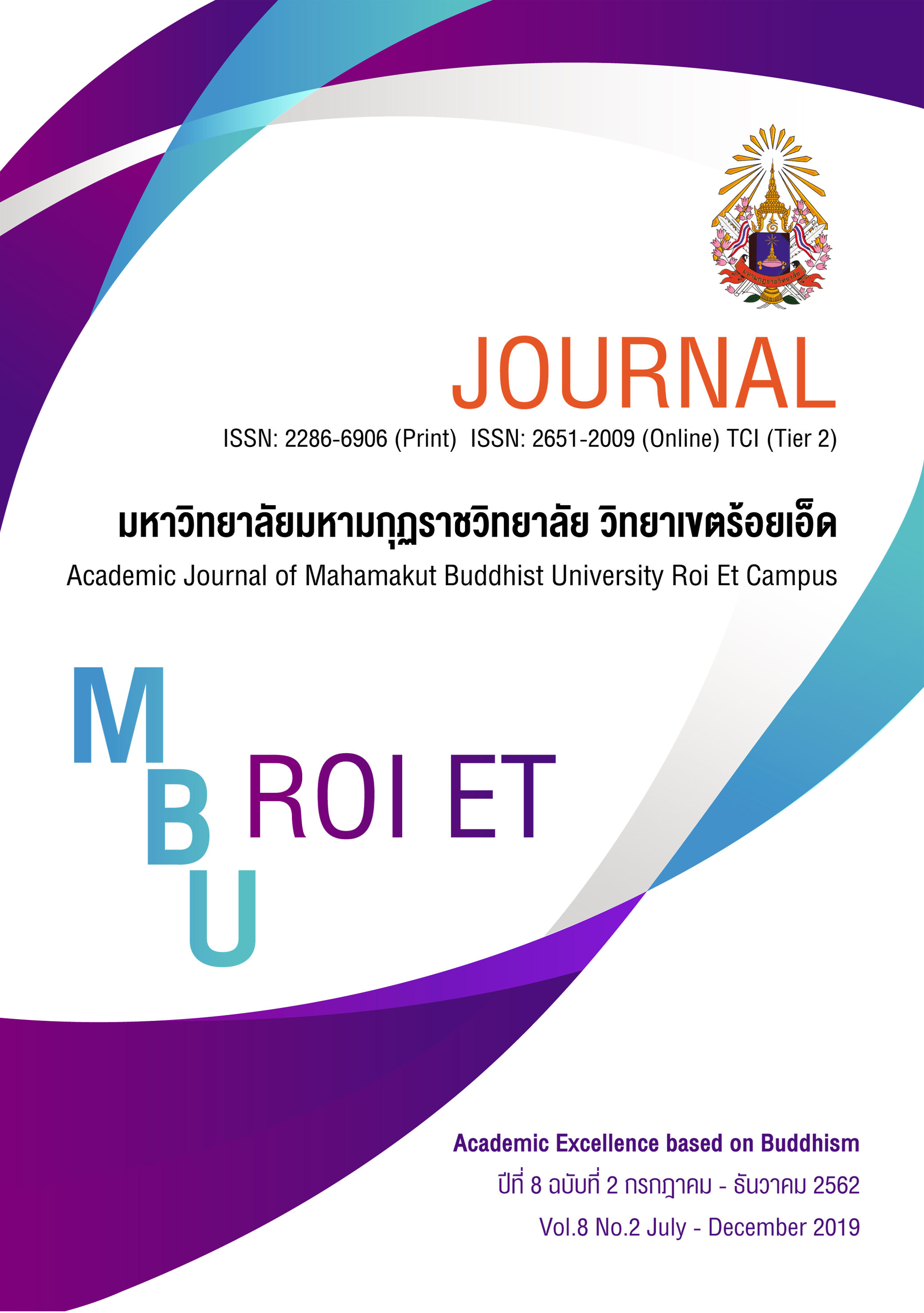An Application of the Four Principles of Iddhipada by the Administrators of the Sri Khot Sub-District Administrative Organization in Chaturaphak Phiman District of Roi Et
Main Article Content
Abstract
The thematic paper served the purposes: 1) to study residents’ opinions on administrators’ applications of Buddhism’s four accomplishments (Iddhipada) to their managements at Sri Khot Sub-District Administrative Organization in Chaturaphak Phiman District of Roi Et province. 2) to draw comparisons between the former’s opinions as such and their different genders, ages, educational levels and occupations, 3) to collects suggestions for enhancing their managements. The populations employed for the research comprised household chiefs or representatives in its authorized area, numbering 1,052 residents. The sampling groups were set through Taro Yamane’s table, forming 290 subjects. The instrument used for the research was the five-rating scale questionnaire with each question possessing IOC the reliability at 0.90. The statistics for data analyses encompassed frequencies, percentages, means, standard deviations, t-tests, F-tests (One-way ANOVA).
Research findings have found the following outcomes: 1) Subjects’ opinions on the administrators’ application of Buddhism’s four accomplishments to their managements at have been rated at the moderate scale in the overall aspect and a single one, as has each of four aspects taken into consideration. With all aspects placed in the descending order of means, they include tasks of: infrastructures, natural resources, economies, and societies respectively. 2) The hypothesis testing results have shown that their opinions as such and the target variables are not significantly correlated with each variable in both aspects, which are not conducive to the established hypotheses. 3) Their suggestions in the descending order of first three frequencies for applying Buddhism’s four accomplishments to their management sat their administrative organization have recommended that they should: applyvimansa (investigation) to generating tasks of promotions of residents’ better and sufficient qualities of their lives in communities, increasingly follow up results of occupational support in the communities, and monitor regular road maintenance of roads to keep them in good use.
Article Details
References
ดาราณี สิทธิพงศ์. (2549). ผลสัมฤทธิ์ในการใช้อิทธิบาท 4 ในการพัฒนาชุมชน: ศึกษาเฉพาะกรณีเทศบาลตำบลทอนหงส์ อำเภอพรหมคีรี จังหวัดนครศรีธรรมราช. สารนิพนธ์ศาสนศาสตร มหาบัณฑิต สาขาวิชารัฐศาสตร์การปกครอง. บัณฑิตวิทยาลัย : มหาวิทยาลัยมหามกุฏราชวิทยาลัย.
บุญชม ศรีสะอาด. (2545). การวิจัยเบื้องต้น. พิมพ์ครั้งที่ 7. กรุงเทพมหานคร : สุวีริยาสาส์น.
พระถวิล ยสินฺธโร (แสงสุด). (2558). การประยุกต์ใช้อิทธิบาท 4 ในการปฏิบัติงานของบุคลากรองค์การบริหารส่วนตำบลหนองพอก อำเภอหนองพอก จังหวัดร้อยเอ็ด. วารสารมหาวิทยาลัยมหามกุฏราชวิทยาลัย วิทยาเขตร้อยเอ็ด. 4(1). 104-118.
พระธรรมโกศาจารย์ (ปัญญานันทภิกขุ). (ม.ป.ป.). พจนานุกรมธรรมของท่านปัญญานันทะ. กรุงเทพมหานคร : ธรรมสภา.
พระธัชพล สิริภทฺโท (งามแพง). (2558). การประยุกต์ใช้หลักอิทธิบาทในการปฏิบัติงานของบุคลากรองค์การบริหารส่วนตำบล อำเภออาจสามารถ จังหวัดร้อยเอ็ด. วารสารมหาวิทยาลัยมหามกุฏราชวิทยาลัย วิทยาเขตร้อยเอ็ด. 4(1). 158-172.
พระราชปัญญากวี(สุบิน เขมิโย). (2528). ประมวลบทพระธรรมเทศนา. กรุงเทพมหานคร : โรงพิมพ์กรมการศาสนา.
สรชัย พิศาลบุตร. (2548). เรียนรู้สถิติและการวิจัยด้วยกรณีศึกษา. กรุงเทพมหานคร : บริษัท จูนพับลิซซิ่ง จำกัด.
สำนักงานคณะกรรมการพัฒนาระบบราชการ. (2546). คู่มือคำอธิบายและแนวทางปฏิบัติตามพระราชกฤษฎีกาว่าด้วยหลักเกณฑ์และวิธีการบริหารกิจการบ้านเมืองที่ดี พ.ศ. 2546. กรุงเทพมหานคร : โรงพิมพ์ ก.พลพิมพ์.
เสกสันต์ บุญยะ. (2548). การใช้อิทธิบาท 4 ในการบริหารบุคคลของผู้บริหารโรงเรียนพระปริยัติธรรมขนาดเล็ก แผนกสามัญศึกษา สังกัดสำนักงานเขตพื้นที่การศึกษาเชียงใหม่ เขต 4. ปริญญานิพนธ์ครุศาสตรมหาบัณฑิต สาขารัฐประศาสนศาสตร์. บัณฑิตวิทยาลัย : มหาวิทยาลัยราชภัฏเชียงใหม่.
องค์การบริหารส่วนตำบลศรีโคตร. (2560). แผนพัฒนาสามปีตำบลศรีโคตร. ร้อยเอ็ด : องค์การบริหารส่วนตำบลศรีโคตร.


